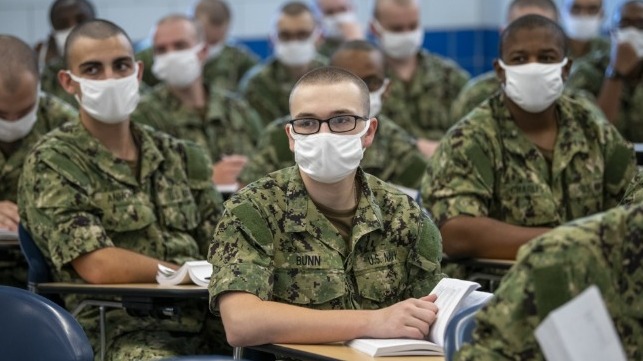U.S. Navy Launches Community College for Sailors and Coast Guardsmen

The Navy's newly-launched United States Naval Community College (USNCC) is launching a pilot program this month with about 600 enlisted students from the Navy, Marine Corps and Coast Guard. The cohort is part of a six month trial of the program and will serve as a template for future expansion.
Northern Virginia Community College, the University of Arizona, the University of Maryland Global Campus, Alexandria Technical and Community College, and the State University System of New York (SUNY Online) were selected by the Navy to offer classes to Sailors, Marines and Coast Guardsmen. Each candidate was selected with input from their chain of command, and the opportunity is of value both to the Navy and to prospective students: for many enlisted servicemembers, access to higher education is a major enlistment or retention incentive.
“We are in an era of great power competition," said Secretary of the Navy Kenneth J. Braithwaite. “Any advantage we can achieve over an adversary will increase our warfighting prowess. Innovating solutions through improvement of critical thinking skills will only serve to give our leaders more flexibility in the effective and efficient deployment of our naval forces.”
Areas of study during the pilot include the nuclear field, cyber security, data analytics, English, math and naval ethics. The second phase will expand those study areas. Following the initial pilot program, a second phase of the pilot program is scheduled for 2022.
“Now that we’ve identified our collaborating schools we can move forward with our program to ensure we offer the best education to our service members,” said Dr. Randi Cosentino, president of the USNCC. “Working in consortium with leading colleges will help us explore outcomes around the design of the program, the processes involved, working relationships and overall impact.”

that matters most
Get the latest maritime news delivered to your inbox daily.
The concept of the USNCC came out of a broad review of the Navy's educational programs initiated under former Navy Secretary Richard Spencer, who commissioned a panel to examine all of the service's educational programs - everything from navigational training through graduate work. The creation of a naval community college program was one of its top identified priorities.
“It is imperative we have a more educated enlisted force, grounded in the understanding of current events, allowing them to add context to the actions they may be ordered to do,” said Braithwaite. “This will provide a critical advantage in any scenario, but specifically to the understanding of how they fit into our overall strategic goals and objectives.”
